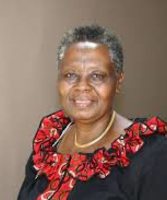
Helen KIJO BISIMBA
YEAR OF MATRICULATION: 1982
EDUCATION:
Helen Kijo-Bisimba, a household name in the field of advocacy and defence of human rights in Tanzania and East Africa, is an alumna of the University of Dar es Salaam, where she graduated in the class of 1985.
She was born in Moshi district, Kilimanjaro region, on 10th October 1954 and had her primary school education in her home village. From there, she was admitted to Weruweru Girls’ Secondary School for four years of ordinary secondary education (1969-1972). From Weruweru she proceeded to advanced secondary education—popularly known as the ‘A’-levels—at Korogwe High School in Tanga region (1973-1974). It was from the latter school, upon passing the advanced certificate of secondary education examinations (ACSEE), that she undertook a diploma course in teacher education at Dar es Salaam Teachers’ College, qualifying as a teacher in 1977. She taught in schools in the country before applying for and getting admission into an undergraduate (bachelor) degree programme at the-then Faculty of Law at the University of Dar es Salaam. She completed the programme in 1985 and earned her degree with honours.
Immediately after completion of her bachelor studies in 1985, Helen worked as an intern at the Ministry of Constitutional and Legal Affairs in Dar es Salaam where she served notably at challenging levels of state attorney, parliamentary draughtsman and equivalent. From 1986 she was employed at the Institute of Adult Education for a decade, and while working there, she decided to enrol on a postgraduate programme in law at the University of Dar es Salaam where she earned her Master of Laws (LLM) degree in 1994.
Helen Kijo-Bisimba was appointed Executive Director of the Legal and Human Rights Centre (LHRC) when the Centre was first established in the country in 1995 and located at what was publicised as ‘Justice Lugakingira House’. The Centre was established as “a non-governmental, voluntary, non-partisan and not-for-profit sharing organization, with the purpose of working to empower and conscientize the people of Tanzania on legal and human rights.” This was a mission which—in the course of efforts to secure and/or protect human rights in society—found the Centre itself frequently in collision with resistant power centres within society. These included, on the one hand, traditional ethnic groups that upheld certain oppressive traditions and practices such as female genital mutilation (FGM) and, on the other hand, the government establishment which upheld certain anachronistic or else oppressive laws. These challenges notwithstanding, within the 23 years of Dr Kijo-Bisimba’s leadership (from 1995 to 2018), the LHRC was “able to empower Tanzanians to know their rights, [to] assert their rights and [to] speak out for their and other people’s rights”, as reflected in an interview published by the International Federation for Human Rights in 2014. At that time, as she recalls:
Civil Society wasn’t known much and we found that people in the villages were not aware of their rights. Now we have monitors in all districts following all human rights issues and paralegals in twenty-eight districts. Furthermore, we advocated for labour matters and today we have new laws governing this. We have been providing legal aid and currently, land matters have flared up since we started inviting investors. So, in short, my career highlights are about advocacy for change in terms of policy, laws and practice.
Dr. Kijo-Bisimba is a keen and reflective author of—or else commentator on—a number of legal works. A few of these can be cited, including:
- The legal process: Can it save girls from FGM? A case of three Maasai girls in Morogoro - A report on the enforcement of the FGM law (2004);
- Justice and rule of law in Tanzania: Selected judgements and writings of Justice James L. Mwalusanya and commentaries (2005);
- Report on HIV/AIDS and human rights in Tanzania: A report on the findings of the field research on HIV/AIDS and its impact on human rights in Tanzania (2005);
- Through a crucible of human rights struggles in Tanzania: A decade of the legal and human rights (2006); and
- Law and justice in Tanzania: Quarter of a Century of the Court of Appeal (with Chris Maina Peter and the LHRC, 2007).
Judging from the public record of her career, Helen Kijo-Bisimba has done well as an exemplary social and legal reformer. Being a trained teacher and methodical educator [a diplomate of a teacher training college—Dar es Salaam TTC—back in the 1970s], she has helped influence younger professionals into dedicated legal counsellors and defenders. On her part, she has played a living example of a compassionate and methodical educator in matters of law and public relations. She is currently officially retired; yet, in her retirement, she is finding time to read and write some key notes and papers from her Warwick doctoral dissertation. The University of Dar es Salaam congratulates her on the high points of her career.

